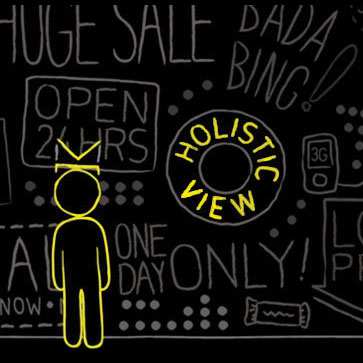Improving Adwords ROI

As the CEO of an online marketing agency, I attend quite a few marketing conferences each year. There I meet a surprising number of people who have tried AdWords and given up, or are only dipping their little toes in the water. And the reason I hear most is that Google AdWords is overpriced.
The plain truth is that AdWords is indeed overpriced - if you aren't doing it right. But it doesn't stop there. A lack of AdWords success could be a symptom of a greater problem.
Because Google pits you directly against your competitors in a war for clicks, AdWords is a rough scorecard of the strength of your business and marketing model. If you can't consistently afford the firstpage spots for your core keywords - and your competitors can - you are losing key battles.
Google processes more than two billion searches per day, holds 66 percent of the worldwide search market share and reaches 80 percent of global Internet users through their content network. In other words, this is a war you cannot afford to lose.
There are five common characteristics of advertisers we see fail - AdWords will always be too expensive for them. I've highlighted the reasons below. While reviewing these, take note of possible holes in your own marketing funnel. Even if you are presently successful with your AdWords ROI, there's probably some room for improvement.
AdWords is overpriced for those with inadequate business models.
A business model is loosely defined as the way your business goes about making money. This encompasses everything from product offerings and pricing to follow-up marketing and customer service. Keep in mind that, with the Internet, everyone gets to compete on a national or even international scale. A business model that can do just fine locally will get annihilated nationally.
You need an Olympian-level business model if you are going to be one of the top five companies in your industry nationwide. This requires tremendous work to constantly refine your product offerings and backend systems. Successful advertisers are willing to break even or lose money on the initial product because their backend marketing system is so reliable that they multiply the revenue from every customer over the subsequent 12-24 months.
AdWords is overpriced for those with poor cash flow.
Even if you have the strongest business model in the game, you may be losing with AdWords due to an unrealistically conservative cash flow.
It would be wonderful if you could pay $100 today and get $200 of profit tomorrow. For some advertisers with one-time transaction products, this can be the case. However, many advertisers must be willing to go negative on their ad spend while waiting for the customer lifetime value to catch up.
It might take 6-12 months before recouping the initial advertising investment. This is particularly true for businesses with a long sales cycle or subscription billing products. AdWords success is often a cash flow game where the best funded get the upper hand.
So, when wondering how competitors can afford to pay those "ridiculous" prices in AdWords, the secret is, they can't - at least not initially. They just have more cash flow than you. (It may also be that they are flat-out losing money. We'll get into that later.)
AdWords is overpriced for those who don't test.
Any inadequacy can be overcome through rigorous testing. As training strengthens the athelete, so does testing improve marketing.
Tools are readily available for straightforward datadriven tests. At a bare minimum, you should be testing ads and landing pages. Once a winner is discovered, another test should be soon to launch. Testing is a continuous process.
Be aware that you are not simply testing one ad or landing page against another. That's an amateur's approach. All of your top traffic ad groups and/or traffic sources deserve their own unique tests; as the "losing" landing page might actually work better for some of your traffic. You need to be data-driven at every level and set up your marketing funnel for maximum success.
AdWords is overpriced for those battling for top position.
As stated earlier, sometimes businesses can't afford what they're paying for AdWords traffic. It may be that the click cost for the number one position is higher than any business in the market can profitably afford. Bidding wars at the top can drive prices to unreasonable levels. This is sometimes referred to as "ego bidding." Who wouldn't want to be at the top? When companies are not tracking their return on ad spend, ego can take over - leading to crazy bids to stay on top.
At every point along your continuum of AdWords success, pay only what you can afford to pay, given your cash flow and margin constraints. This requires conversion tracking back to every keyword and ad group.
AdWords is overpriced for those with poor account structure.
Let's assume you have a proven business model with strong cash flow and have experienced success with other forms of advertising. In this case, the solution is simple: use AdWords better. The good news is that if you have taken care of all the above, managing your AdWords account effectively is the easy part.
There are dozens of errors that novices make; a group that probably includes many of your competitors. Poor account structure is at the top of the list. Structure your account so that you can display the most relevant ad for every keyword search. This means ad groups are all comprised of tightly related keywords.
AdWords is a unique beast in that prices will go down as your campaigns are increasingly well managed. Magazines certainly don't give you a price break if more people call your 800 number, but Google does. They want their users to have a good experience (and to keep clicking ads), so they reward you with lower click costs if your ads are relevant. A good account structure with frequent ad split testing will enable you to have the most relevant ads possible for each keyword.
Negative keywords also play an important part in keeping costs down. Negative keywords act as filters on your standard keyword list to block unwanted traffic. So, if you are advertising on "night stands," you might show up for "one night stands." Simply add "one" as a negative keyword to filter out this unwanted (and non-converting) traffic. Advertisers can typically cut costs by 20 percent with a thorough list of negative keywords.
Needless to say, many other competencies are required for running an effective AdWords account. While you can certainly get started with zero experience with AdWords, you will never compete in crowded, high-volume markets without being at the top of your game. Success with paid search marketing requires a good deal of training, finesse and experience. Plenty of free training can be found online and there is no shortage of agencies that would be happy to take the burden off your hands.
The key is to not give up on this traffic source. Use AdWords as your own scorecard of success. There is no feeling like seeing your ad above the competition - and knowing you can afford to be there. Success is a moving target with the changing competitive landscape, so there's no time like the present.
About the Author: Timothy Seward is the CEO & Founder of ROI Revolution, Inc. Learn more about ROI Revolution's paid search management services and request a free strategy session at www.roirevolution.com/websitemagazine.









